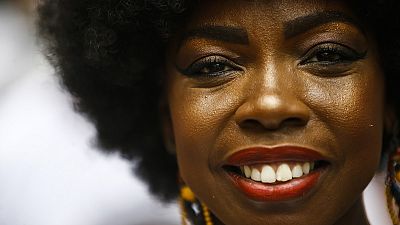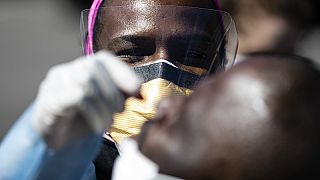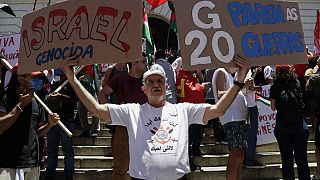Brazil
Another Afro-Brazilian Life Bites the Dust at the Hands of Police
João Alberto Silveira Freitas is the 40-year-old Afro-Brazilian man who was beaten to death by two white men in the French-owned supermarket franchise, Carrefour in Porto Alegre, Rio Grande do Sul, Brazil. A violent incident that occurred following an argument between the three men and which was caught on video by onlookers filming on their smartphones.
The footage of the white security guard Magno Braz Borges, 30, and the white military police officer Giovani Gaspar da Silva, 24, lynching the immobilised Freitas bleeding on the ground quickly began circulating across various social media platforms almost immediately afterwards on Thursday night.
Both perpetrators have since been arrested for first-degree murder and Carrefour has issued a public statement condemning the act as criminal. Homicide and Protection of the Person (DHPP) Police Station in Porto Alegre are currently investigating the crime.
The cause of death of the victim is as yet unknown but a forensic preliminary analysis indicated that it may have been asphyxiation.
Brazilian Black Lives Matter
Reminiscent of a similar incident of racially-motivated police brutality with George Floyd in the United States back in March that shook the world perhaps just as hard as the Covid-19 pandemic this year.
But even amid a revival of a now-global Black Lives Matter movement, we see yet another crime of violence against a black body holding African blood in Brazil — and coincidentally, on the eve of Black Consciousness Day on November 20.
A national public holiday which — in spite of resistance from some segments of non-Afro Brazilian society, is a date that is now recognised by federal decree in over a thousand Brazilian municipalities and is a symbol of the Afro-Brazilian historical resilience and cultural influence in a country founded on the enslavement of enslaved Africans and invaded Native Americans by European colonisers.
The History of Black Consciousness Day in Brazil
The public holiday was first officially instituted as state law in the state of Rio Grande do Sul in 1987 and the event gradually began to gain popularity in more parts of the country as Brazil — the recipient of around 4.5 million enslaved Africans over 350 years, is home to the world’s second-largest population of Afro people only second to Nigeria.
In 1995, the 300-year anniversary mark of the death of Afro-Brazilian freedom fighter Zumbi dos Palmares further cemented the widespread adoption of the holiday and it was integrated into the school calendar in 2003 in addition to the institution of a federal law requiring that African and Afro-Brazilian history and culture be taught in class.
2011 was the year that Black Consciousness Day was officially instituted on a federal level in Brazil and it has since become — according to Wlamyra Albuquerque, a professor at the Federal University of Bahia and author of the book 'A Game of Dissimulation: Abolition and Black Citizenship in Brazil,' a symbol of the resistance of Afro-Brazilians, the acknowledgement of the Afro-Brazilian legacy and “a day to reaffirm the demands of the black people.”
Also a day to commemorate the death of Quilombola leader Zumbi dos Palmares.
An African Queen and an Afro-Brazilian Icon
The Afro-Brazilian freedom-fighting icon Zumbi was the grandson of Aqualtune — a Congolese princess of the 1600s believed to be of Yoruba origins who was also a warrior in her own right.
According to historical accounts, Aqualtune was captured and sold into slavery to Recife, Brazil after leading a 10,0000 army into battle and suffering a defeat.
A few months before giving birth, the princess made her escape in 1630 to a place in the mountains to the west called Palmares as rumour told of a free and multiracial community
Palmares spanned 200 kilometres across today’s Pernambuco and Alagoas states in Brazil and saw around 50,000 people — comprising Afro-Brazilians, Native Americans and white fugitives, at its peak in the 1970s.
The self-sufficient community survived almost 100 years — even thwarting attempted invasions by the Portuguese and Ditch colonisers with Princess Aqualtune as a leader.
Her grandson Zumbi was born to her eldest daughter Sabina in 1655, in the middle of the war with the Dutch and he would grow up to become the last ruler of Palmares — fighting against the Portugues for 15 years before they behead him on November 20 1695
Zumbi is still a hero to millions of Afro-Brazilians and this date is now honoured as Black Consciousness day in Brazil.
Afro-Brazil Stand Up
The lynching by police of João Alberto Silveira Freitas in Carrefour seen on the eve of this monumental holiday resulted in protests the day of at the Zumbi dos Palmares Square and in front of one of the chain shops in Asa Sul.
A rally organised by the District Front for Disengagement saw Afro-Brazilian youth — some hailing from Black Movements and organisations for the Defence of Youth Rights come together with the additional support of their non-black allies.
As today, many empowered Afro-Brazilians are ready to continue the legacy of Princess Aqualtune and Quilombola leader Zumbi dos Palmares and demand racial equality within a country still plagued by the racist white supremacist oppression of its colonial-rooted structure — as they proclaim #BlackLivesMatter in Brazil, and in every sphere of Brazilian society.













02:19
From tattoos to bark cloths, Samoa keeps proud traditions alive
02:19
Denzel Washington and wife support son at premiere of 'The Piano Lesson'
01:05
US probes racist text messages referencing slavery sent to Black men, women
02:19
Germany exhibition aims to broaden understanding of Africa through art
Go to video
Slavery: UK does not want 'money transfer' as reparation
02:19
Morocco exhibition shows treasures of ancient port city of Chellah